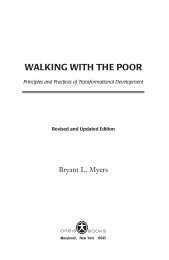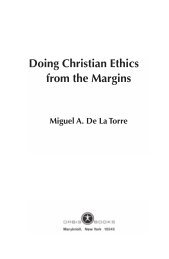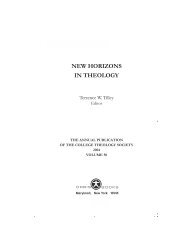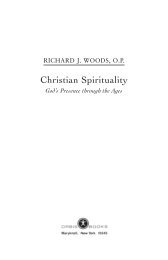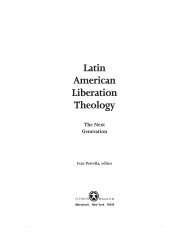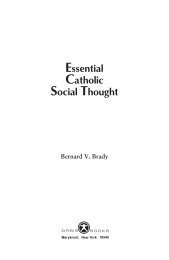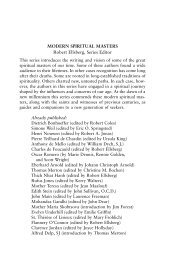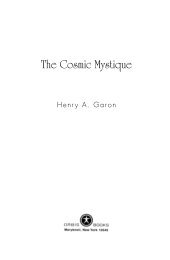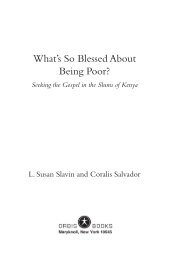Thomas Merton Selected Essays - Orbis Books
Thomas Merton Selected Essays - Orbis Books
Thomas Merton Selected Essays - Orbis Books
Create successful ePaper yourself
Turn your PDF publications into a flip-book with our unique Google optimized e-Paper software.
tians inhibit the growth of the life within them by their morbid depression atnot being able to do what they can’t. One of the great secrets of the Christianlife is the kind of peaceful humility which trusts in God for results and does notget too disturbed by the constant failures of human weakness.The story of my own conversion has been told elsewhere in considerabledetail. 16 There is no need to go into it all again here, except to say that I had triedmost of the typical solutions that men apply to their problems before I becamea Catholic. I found that all these other solutions were inadequate. I knew somethingof the life of the artist and intellectual because my father was an artist andI was brought up, for better or for worse, as an intellectual.I went through schools and colleges in America and France and England.After a year at Cambridge I came back to Columbia and then went into teachingand writing. That was what I was up to when I finally found my way into thelittle church of Corpus Christi on 121st Street, just off Broadway, at the edge ofthe Columbia campus.Meanwhile I had tried to construct a philosophy of life on four different foundations.I had begun with plain, atheistic hedonism—which is a fancy title for alife of absolute selfishness. Believe in nothing, have a good time, and try to satisfyall your capacities for pleasure without hurting other people too much. It waswhat my generation believed in, when it was entering into manhood after havingconsidered the society of its elders during the 1920s. In order to give this vagueand irrational code an intellectual structure, I rebuilt its foundations with the fragmentsI was able to gather from a hasty and superficial reading of Freud and Jung.The reason why one had to lead this life devoted to self-satisfaction was thatmental health depended on keeping one’s mind from becoming a tangle ofrepressions. This made me excessively introspective. In order to escape into theworld outside myself, and also in order to take revenge for my own disgust withmyself by venting it all on a “scapegoat,” I became a communist sympathizerand unloaded all my sins on the back of the bourgeoisie. It made me feel good,but not for long. Campus communism at Columbia was untidy and feeble, andI did not take well to the incantation of slogans as a substitute for thought.When it became clear that the unprincipled opportunism of the party line hadno other end than to promote the interests of those in power in “the party,” Igave up communism in complete disgust.Then I tried to return to the religion of my childhood—a vague Protestantism.It was too vague. I wanted a solid foundation of doctrinal truth to buildon, and I could not find any. Protestantism was so highly subjective that each16. (New York: Harcourt, Brace, 1948).
individual was isolated with his own personal experience, and faith had become,in practice, almost incommunicable. It was almost impossible to find out exactlywhat my Protestant friends really believed. Nevertheless, the element of personalexperience in religion fascinated me, and I explored the literature of orientalmysticism without much profit except that I came away with the convictionthat man could, by detachment from created things and by a profound interiortransformation, enter into direct experimental contact with God.The fact that God could exist had meanwhile been impressed upon me byGilson’s . When I began to find out more aboutscholastic philosophy and theology by reading Jacques Maritain and parts of St.<strong>Thomas</strong>, and when I began to understand something of the nature of the souland its life, my conversion followed quite logically.The intellectual basis of my conversion was simply this: I found that Godexisted, and that He was the source of all reality; was, in fact, Reality, Truth, Lifeitself. He was pure actuality. On the other hand, I found that I had an intellectmade to apprehend the highest and most perfect Truth in a supernatural intuitionborn of love, and that I had a free will that was capable of turning all the powers ofmy being either toward that Truth or away from it. Finally, since I could not attainthis consummation by my own unaided natural powers, I would have to enter intothe economy of means and helps called “graces” won for me by Christ. ThereforeI was baptized and became a Christian at least in name.It is evident that the story of my life up to the day of my baptism is hardlythe adequate story of my “conversion.” My conversion is still going on. Conversionis something that is prolonged over a whole lifetime. Its progress leads itover a succession of peaks and valleys, but normally the ascent is continuous inthe sense that each new valley is higher than the last one.I have said that the problem of the Christian life is not solved by baptismalone. Sanctifying grace, which makes us “live in Christ” and nourishes us withthe fruits of His Passion and endows us with a share in His risen glory, is a talentthat has to be increased and developed. We must enter deeper and deeperinto this life of Christ. We must give ourselves over more and more fully tothe mighty and transforming power of grace. Why? Because, as I have said, thepurpose of our lives is to make us more and more productive members of theMystical Body of Christ. 17We increase and deepen our participation in the life of the Body by theactivity of our minds and wills, illuminated and guided by the Holy Ghost. We17. John 15:1, 2, 6, 8.
must therefore keep growing in our knowledge and love of God and in our lovefor other men. The power of good operative habits must take ever greater andgreater hold upon us. The Truth we believe in must work itself more and morefully into the very substance of our lives until our whole existence is nothing butvision and love.What this means in practice is summed up by one word that most men areafraid of: . “We are debtors not to the flesh to live according to theflesh. For if you live according to the flesh, you shall die; but if by the spirityou mortify the deeds of the flesh, you shall live.” 18 Our divine sonship and ourinheritance of the joys of the divine life depend on our union with Christ whodied for us on the Cross. We are only “joint-heirs with Him,” “if so we sufferwith him that we may be glorified with him.” 19 “For they that are Christ’s havecrucified their flesh with its vices and concupiscences.” 20The reason for this is not purely negative. Penance and mortification are notimposed on us merely as a vindictive punishment. We tend to forget the medicinalvalue of penance. We must deny our faculties the satisfactions proper to alower form of life in order to accustom them, little by little, to the higher life ofthe Spirit in which God is known and loved as He is in Himself and not as Heappears reflected in His creatures. Asceticism is essential to the Christian life.Without self-denial we cannot be Christ’s disciples. “If any man will come afterme, let him deny himself and take up his cross and come, follow me.” 21It took me almost a year to discover that it was not possible to live a lifeexactly like that led by non-Christians and remain a Christian, no matter howconvinced one might be of the truth of Christianity. I admit that it is possibleand necessary for many Christians to live immersed in “the world” and all that itimplies, but they are precisely the ones who ought to practice the most difficultasceticism. If they are to live as true members of Christ and radiate the divineinfluence among the men with whom they are in contact, they will be obligedto develop rich interior lives of union with God, and this union will have to bedeep enough to weather the demands of hard work and constant contact withthings that would defile a weaker spirit.My own weakness convinced me that I ought to take upon myself the obligationsof a higher state of life, not because I felt strong enough to live up to theseobligations, but because I realized that they implied special helps and gracesfrom God. I became a Cistercian novice in the Trappist Abbey of Gethsemani,18. Romans 8:12-13.19. Romans 8:17.20. Galatians 5:24.21. Matthew 16:24.
Kentucky. God had been exceedingly generous with me. In exchange for a halfarticulateacknowledgment of my absolute helplessness, He had called me toone of the most austere orders in the Church. And a few years before, I had beenquite convinced that I did not have good enough health to lead the ordinary lifeof men in the world.If I began a meditation on this second great step in my conversion, I wouldgo on for pages and fill another book, which would perhaps be tedious to everyonebut myself, because the mystery of God’s goodness to me is something thatdazzles me more and more from day to day and I cannot exhaust its fascination.The monastic life is nothing but a search for God, a search that has beenstreamlined and intensified by the rejection of every other concern. A Christianliving in the world can temper his pursuit of God’s Truth with other secondaryinterests, as long as these do not conflict with his Christian vocation. ButGod becomes the monk’s whole reason for existing. Nothing that does not leadto God, nothing that does not give him glory, is of any account. The monk,and especially the Trappist Cistercian, is by profession a contemplative. He isimmersed and swallowed up in the tide of life and vision that is poured outupon the world through the Passion of Our Divine Savior. The monk’s life is alife of ardent love for Christ, who is “the way, the truth and the life.”And yet, however great may be the grace of monastic profession, it still fallsfar short of the priesthood. There is no greater gift given by Christ to the membersof His Church than the grace of the priesthood. Ordination impressesupon the soul an indelible character which identifies a man with Christ as priestand victim. The grace of the priesthood sinks a man into the very depths of theChrist-Life, places him at the heart of all that is real and vital, and arms himwith the power which has secretly shaped all history until now and which is fastpreparing the final revelation of the glory of the sons of God, in Christ Jesus.The priest holds in his hands the Judge and Savior of men. He speaks five wordsand the Life of the world is present on the altar before him. He holds betweenhis fingers the Heart that is throbbing in the deepest center of all the hearts ofthe saints. He holds the life of all the saints; he holds God Himself in his hands!Is it possible to imagine a man, endowed with such power from God, notbeing completely transformed by his daily exercise of it?I cannot write much here about this third and most tremendous step in myconversion. Its effects are only just beginning dimly to dawn upon me. I am justbeginning to see something of the breadth of the new horizons that are openedup before me by the Christ of my daily Mass.At four o’clock in the morning, after the choir has finished chanting the
night office begun at 1:30 or 2 a.m., in the Basilica of the Abbey, the Cistercianpriests file through the shadows of the transept into their sacristy. High up inthe belfry the little bell tolls for Masses that are about to begin. We take off ourwhite cowls and put on our vestments, and depart severally to our dim altars inthe candlelit side chapels. And the great Sacrifice begins, as we bow at the footof the altar of God. We go up to God with our hearts steeped in the peace ofthe Psalms, our minds swimming in the calm wonder of revelation. We offer thehost and the chalice to God, for His blessing upon the Sacrifice.We bow down before the thrice Holy God, and begin the Canon, drawinginto the heart of our Mass the lives and souls of all those whom Christ’s Heartloves in our hearts. We press them to His Heart in our hearts, as more than onceduring the Canon we cry out to God with a great cry that shakes our depths,the cry of those who are still divided and separated in some measure from theperfect union of the saints in Christ. We bow in silence, holding the thin whitehost. Everything becomes luminous and calm. With a simplicity and a peacethat are more powerful than all thunder, Christ utters Himself through us andis present upon the altar. The might of His Spirit sings within us, and the Spiritcries, “Abba, Father!” and prays for us within us with a pleading too deep andtoo magnificent for us to understand.It is a sweet and terrible thing to feel the fire of that wonderful pleading growup and begin to burn in the secret depths of your being. Yet, by the mercy ofGod, you are not consumed, and your hand does not tremble when you lift upthe body and blood of Christ and offer Him to the Father: all honor and glory!You are sustained by the expectation of the final act, the Communion that completesthe Sacrifice. The wonderful calm anguish, generated within your heartby the prayer of the Spirit, is quenched in the chalice of your Communion andyou sink into the clear-eyed peace of Christ, the peace which is the peace andsimplicity of an Eternal Child!Then, for an hour, perhaps more, it is this peace that prays within you withan ineffable power. You go off somewhere in the dark recesses of the church andkneel behind something, and half the time you forget where you are.Day after day it is the same external act: but always with a new inner meaning.Morning after morning you go to the dim altar weaker and more lowly thanyou have ever been before, and leave it lost in a more incomprehensible greatnessthan you have ever known before. A few months of the Mass have emptiedme more and filled me more than seven years of monastic asceticism.I used to have what I considered a degree of prayer. It was something Ithought I could refer to as “my prayer.” I rested in it, and it was silent and sweet.It seemed to me to be something rich and beautiful. Now I have no prayer. I am
possessed by the prayer of One who is Almighty. And His prayer in me is somethingmore than prayer because it is an infinite Sacrifice.Prayer used to rise out of my soul as a desire that raised me up to God. It wasmy desire, and I could see where it was going, and I could take complacency init. Now prayer is an earthquake which rends the rocks on which the substanceof my being is built, and I do not know where it is going or what it is doing:sometimes it raises the dead, but only to assuage my terror. And sometimes itthrows me to the living, the way the early Christians were thrown to the lions.The Mass has made an end forever of what I used to treasure as an interiorsolitude. It has shown me the way to a height of solitude I never dreamed ofbecause its paradox was utterly beyond my own imagining. This is the solitudeof Christ in the Blessed Sacrament. Jesus in the host is alone, not because Heis remote and isolated from everybody, but because He is . And because He is given to everybody, He can belong exclusivelyto nobody. And yet He is so alone that He belongs entirely to each one whopossesses Him.If you are afraid of love, never become a priest, never say Mass. The Mass willdraw down upon your soul a torrent of interior suffering which has only onefunction—to break you wide open and let everybody in the world into yourheart. If you are afraid of people, never say Mass! If you want to guard your heartagainst invasion, never say Mass! For when you begin to say Mass, the Spirit ofGod awakes like a giant inside you and bursts the locks of your private sanctuaryand calls all the people in the world to come into your heart. If you say Mass,you condemn your soul to the torment of a love that is so vast and so insatiablethat you will never be able to bear it alone. That love is the love of the Heart ofJesus, burning within your own miserable heart, and bringing down upon youthe huge weight of His pity for all the sins of the world!Do you know what that love will do to you if you let it work on your soul, ifyou do not resist it? It will devour you. It will kill you. It will break your heart.I wish I could speak intelligibly about the absolute imperiousness of Christ’slove in the heart of a priest. Without actually doing violence to your heart (forChrist’s love always works with a power that is smooth and delicate, even whenit smashes you!), the Spirit strikes like lightning as soon as there is the slightestopening in your will, and in a flash He is upon you with His new demand. Andalmost every time it seems to be a sweeping demand for your whole self, everything,a holocaust.Where is there a hiding place, where is there a high mountain or a deep forestor an unvisited desert, where a poor priest can go to escape from the voicesof men that are brought to the ears of his soul by the Holy Spirit? Where can a
creature without courage and without virtue, and almost without faith, hide hishead and blot out the image of the faces that look at him and hands that reachout to him? Where can he go to stop his ears against the voices that cry, “Die forme! Die for me!”?That is not all. It is not only the ones we must die for that terrify us: it is mostof all the ones we must live for. They demand not only our strength and ourhealth and our time, but if we listen to the voice of Christ in them, there will bemany among them who will claim, as an imperious right, the deepest recesses ofyour heart and soul: because we are their Christ and we have to love them withthe same love with which Christ loves them. “This is my commandment, thatyou love one another as I have loved you.” 22 It is not enough to be a mere agent ofGod, transacting His business and then retiring within ourselves. We have to dothe work of Him that sent us, which is to live consumed in the suffering of love.“A woman when she is in labor hath sorrow because her hour is come; butwhen she hath brought forth the child she remembereth no more the anguishfor joy that a man is born into the world.” 23 The great work of Christ would becompleted more quickly if we were more willing to bear the anguish of His love.Yet is it any wonder that we flee from a love that destroys us? Alas, we forget thatit destroys us only to transform us. The things the Spirit of God demands of usin order to form the Mystical Body of the Whole Christ, in order that “a manmay be born into the world,” contradict our own ideals of a sanctity in which weourselves are not sacrificed, consumed, and transformed.We resist the exigencies of a love that seeks to fulfill us by melting us down inthe crucible from which the is to emerge. But it is only in Christ, in thewhole Christ, that each individual personality can be completely perfected andfulfilled. For Christ is our life, and until we live perfectly in Him, and He in us,we still fall short of the man we were intended to be, because something of ourlife is still lacking to us.Let us all enter into the great prayer of the Church, which centers upon theSacrifice of Christ in the Mass, and in that prayer let us remember one another,readers and writer, priest and faithful. Let us ask God through Christ, and inthe unity of His Spirit, to give us the courage not to run away from His love, notto run away from His fire, and not to run away from the divine love we find inone another.22. John 15:12.23. John 16:21.



